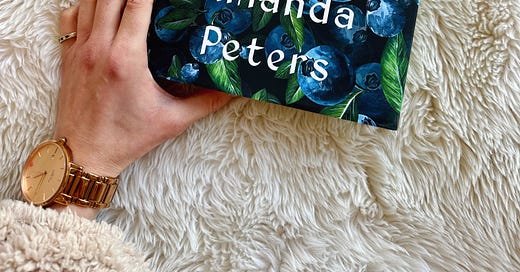The Berry Pickers Reminds Us That Liberation Is Intertwined
On the right to culture, identity, and preservation
[Dear readers: This issue contains discussion of kidnapping, murder and bodily violence, and genocide.]
The Berry Pickers, a debut novel from Amanda Peters, tells the story of Ruthie, a young Mi’kmaq girl from Nova Scotia who is stolen by a white family and raised to believe she is their birth child (Catapult, 2023). Peters brings to the forefront an issue not just overlooked and dismissed by individuals and politicians in the U.S.—that issue being Missing and Murdered Indigenous Women, Girls, and Two Spirits (MMIWG2S)—but also the historical whitewashing of Indigenous identity. It’s a story of familial and cultural loss, preservation, and unshaken belief.
Ruthie’s “mother,” or kidnapper, “had herself convinced that [Ruthie had] been abandoned and she’d saved [her]” (Peters, 268). She and her husband, who were unable to have children of their own, never assume Ruthie will discover the truth, dismissing any questions she has with explanations of genetics and falsified memories. “‘You’re confused,’” they tell her, over and over (25). They see Ruthie as better off with them, that they came along and rescued her from an inferior ancestry. And that same attitude—that an Indigenous child is somehow lesser—is echoed in the white police officers who fail Ruthie’s birth family: “‘There are only three of us police officers, and we had a break-in down at the farm supply store a couple weeks back,’” an officer tells the family when dismissing their request to help find their daughter (18).
Unlike the family she is raised to believe as her own, a family that erases Ruthie’s heritage in favor of whiteness, Ruthie’s birth family continues to engrain values of their Indigenous culture into their everyday lives, including learning to speak Mi’kmaq. “‘White folks been trying to take the Indian out of us for centuries…But now that you know, you gotta let people know…Gotta reclaim what was taken away’” (293-4).
While reading The Berry Pickers and watching the ongoing genocide of Palestinians by the Israeli government, it’s hard not to notice the interconnected nature of their experiences against oppressive colonialist forces.* The unified fight for liberation shines strong, coming out clearly in Ruthie and her family’s history and present, and that of Palestinians made visible on social media. Their fight for safety, security, and visibility of humanity, along with their preservation of identity, all act as reminders that sovereignty and liberation are intertwined; for unless we all are free, nobody is free.
*While there are overlaps in the struggle for liberation and sovereignty, and in the fight against colonialist and imperialist powers, particularly between the Land Back and Free Palestine movements, these connections should not be made at the expense of erasure of individual experiences. Conflating the two as one and the same will undoubtedly overlook nuances that will prevent complete dismantlement of oppressive structures. Rather, we encourage individuals to consider the two movements as intertwined and in conversation.
Intertwined fights for liberation
Just as settler colonialism aims to overtake homes and land, colonialism aims to control—and if not, overtake–the persons on said land. Like Ruthie, Indigenous women, girls, and two-spirit individuals face a heightened risk of abduction, violence, and murder—and face a lack of response when these actions occur. The MMIWG2S movement aims to raise awareness of, combat, and create structural change against this violence through policy. In Palestine, Palestinians also face the impact of settler colonialism on bodily autonomy, safety, and security as the Israeli government limits access to reproductive and general care for women.
The fight in Palestine for not just the right to return, but the right to their home, is similar to the Indigenous Land Back movement. “The right of return and LANDBACK are both promises that harbor the same meaning—that we will outlast colonial governments and laws imposed on us and our relatives, and live in right relations back where we are from.” —NDN Collective
Contact your reps in support of both:
Find your representatives in Congress here
Find your representatives in the Senate here
Contact the White House
Learn more about actions to take to free Palestine, and find a complete call/email/fax script here.
“I am marvelling at how I’ve been shaped and moulded by women, even though I was absent from them most of my life.”
—The Berry Pickers, p3
Others’ thoughts?
“The story follows both characters over decades of their lives through violence, tragedy, resilience, and healing and is ultimately a testament to the power of family, history, and connection.” —Shondaland
“A cogent and heartfelt look at the ineffable pull of family ties.” —Publishers Weekly
If you liked The Berry Pickers, read…
**Note: We receive a small commission on any sales made through our affiliate links.
Thanks so much for taking the time to read. If you enjoyed this newsletter, please share with friends, and consider subscribing if you have not yet already.
As always, please continue to push for a free Palestine by contacting your political reps, amplifying Palestinians on social media, attending rallies and protests, and more. Here are further ways to get involved.
We’ll be back in just a few weeks with our end-of-month issue to break down current topics in the publishing world.
Xx,
ad astra



